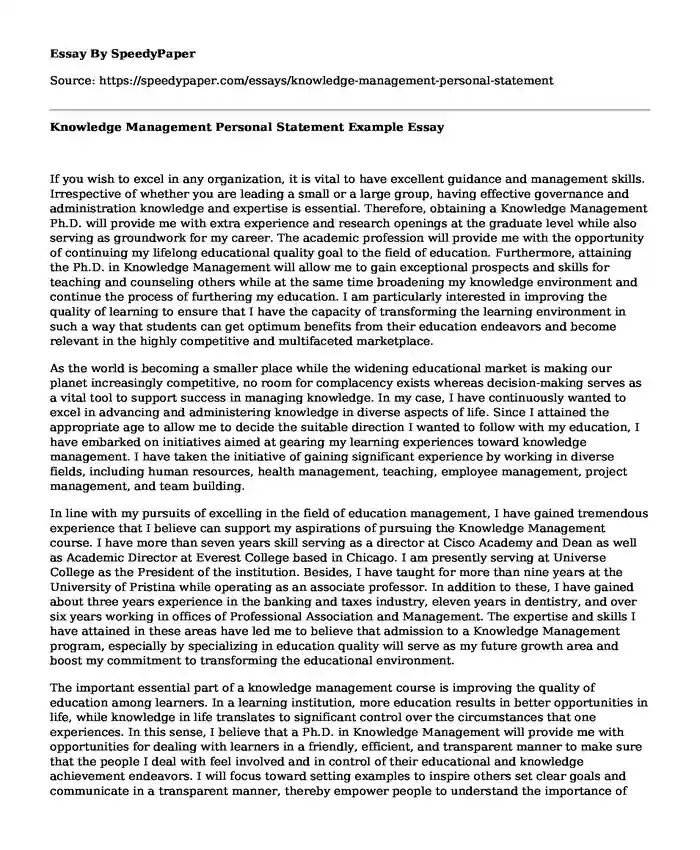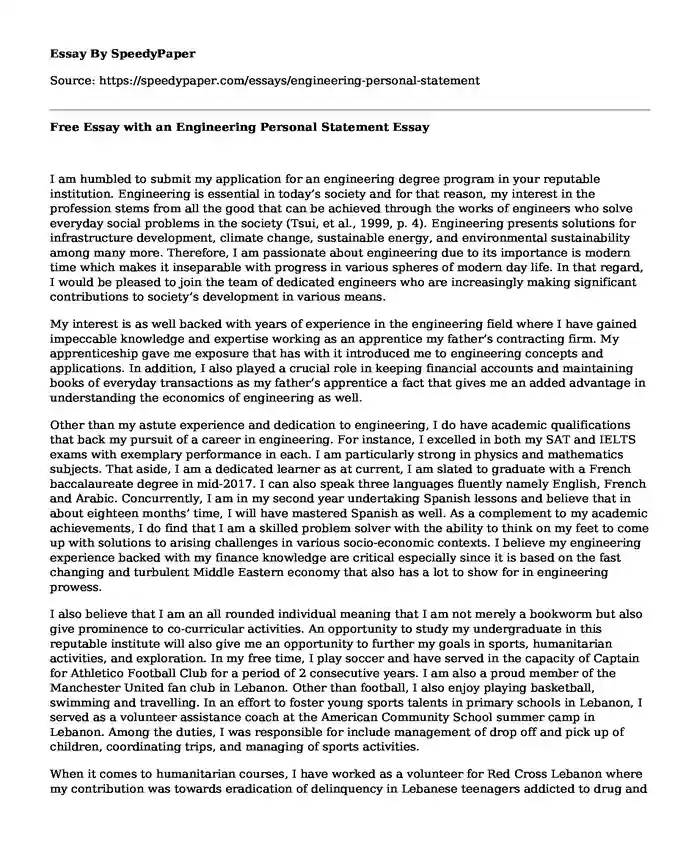
How to write a personal statement: step-by-step guide and free samples
|
Table of contents: |
Is it the time for you to enter college? Are you working hard to learn everything you need to succeed with your application? Do you know how to write a personal statement that will impress the committee and leave a positive impression about you? Unfortunately, a considerable number of prospective students know little about this type of essay and its prominence. Consequently, they fail with their applications, as there is nothing that can strengthen them.
What is the basis of this paper type? What makes a good personal statement? Why does its structure and formatting matter? Keep reading to learn more about the essay and its specifications. It will help you showcase your strong points and will make your application stand out.
What is a personal statement?
Before you dive into the detailed instructions on how to write a personal statement, make sure you know the basics. A personal statement is a short account of your experiences, achievements, and goals that accompanies college or job applications. This piece helps your application stand out among others and adds a personal touch other papes, like school records and resumes, lack.
A decent personal statement is not a bare list of your achievements and lifetime goals. Instead, it is an opportunity to express your ideas, thoughts, and aspirations that will show your values and priorities. Therefore, it is a great way to highlight your perspectives, unique experiences, enthusiasm, and outlook. Be honest and straightforward when talking about your weaknesses, as they may be proof of your honesty, as well as your constant and unbeatable desire to grow.
Talking about personal statements, users may come across different types. The most used ones include:
- A comprehensive personal statement that’s structured like a short essay and contains everything you deem pertinent to your application. It is one of the most general paper types that seems to be the most complicated to deal with. There are no specific rules and guidelines to follow, so you will have to make maximum effort to single out the information that matters and can make a difference. Avoid cliches and general phrases that tell nothing about you as a personality or your professional features.
- A response type of personal statement has structured responses to questions posed in an academic program admission requirements or a position description. It is frequently called a reaction or reflection paper, the most personal type of writing. The main goal here is to share your vision on a particular subject matter.
Additionally, it is indispensable to mention the cover letter, admission paper, and statement of purpose, which are also considered to be variations of the personal statement. All these options are aimed at convincing the audience to invest in the writer’s education, work, or achievements. Follow effective tips for writing a personal statement to show sufficient evidence of your potential and ability to thrive.
Why this assignment type is so crucial for students?
A personal statement is a golden opportunity to showcase oneself. It's a platform where individuality, achievements, and aspirations shine. Often, universities use personal statements as a decisive factor for admissions. Here's where a personal statement help steps in.This aid is more than just essay writing help. It's an invaluable asset that helps students express themselves authentically and compellingly. Indeed, a well-crafted personal statement can be a student's trump card. It gives an edge in the fiercely competitive admission processes.
Further, the professional touch of a writing personal statement service ensures quality. It enhances your statement, making it stand out among many applications. Thus, investing in a reliable service is akin to investing in your future. In essence, personal statements can open doors to dream universities. They hold the power to shape students' academic journey.
How to write a personal statement
Unlike most academic papers, personal statements are focused on the writer, which makes them surprisingly challenging. Unfortunately, the need to squeeze a lifetime of experiences into a few short paragraphs often results in writer’s block. So to make the task more manageable, let’s go over the most challenging questions on how to write a personal statement.
Writing tip from SpeedyPaper
How long should a personal statement be?
The word count depends on the purpose of a personal statement. Job applications usually require shorter pieces, no longer than a paragraph or two. University applications are generally longer, and schools provide exact word count limits you must follow. It’s better to write a bit less, as the digital application form may automatically cut the symbols that exceed the limit.
While you should keep track of the word count, we recommend you initially write as much as possible and go back to tighten your writing at the editing stage. This approach is faster than trying to fit within the constraints at the onset, as it will likely lead to doubt and writer’s block and worsen your writing quality.
What to include in personal statement?
First, read the admission requirements or job posting carefully to decide whether to write a comprehensive piece or respond to questions. If there are no specific requirements, you can introduce the common personal statement topics, such as:
- Reasons why you chose to apply to a particular school, program, or position
- Relevant experiences, qualities, or skills making you the best candidate
- Your highest achievements illustrating that you are the perfect fit for the role
- Your potential contributions to the organization if you are accepted
- Your short and long-term goals if your application is approved
When brainstorming ideas, please remember to keep the personal statement relevant to a specific position, school, or program and customized to account for particular requirements. You cannot send out the same boilerplate piece to a dozen schools or companies and expect to get positive responses.
How to start a personal statement?
“Why?” is the central question the personal statement introduction should answer. Of course, the context will differ depending on your application, but you should always lead with why you’re interested in the opportunity, like getting a job or entering a college program.
The biggest and most common mistake when thinking about how to begin personal statement is opening it like an essay with a cliche, like:
- Ever since I was a little girl…
- All my life, I’ve been interested…
- I’ve always known I wanted to…
- I remember the first time I decided to become…
- I am applying for this program because…
These phrases have been used so much that they have lost all meaning. So skip the lengthy intro and lead with the main point. First, explain how the position, program, or class is going to make your life better, improve your career prospects, or provide the last lacking piece of experience you need to fulfill your life’s dream. Then, expand on the idea by providing evidence supporting your initial claim. For instance, if you’re applying to grad school, highlight your Bachelor’s degree and relevant job experience as well as potential career opportunities a Master’s degree will provide.
Another common mistake is detailing your qualifications instead of your experiences and skills. Remember that a personal statement supplements other papers, such as your school records or resume. Therefore, the admission board or hiring manager already has all the facts. Instead of wasting the limited word count, highlight specific examples of your skills in action, emphasize your academic or professional interests, and detail your main achievements. Ideally, everything you include in a personal statement should align with the values, goals, or mission of the organization you’re applying to.
How to end a personal statement?
Concluding personal statement lines are much like the last paragraph of an essay. You need to reiterate your thesis (the goal you’ve mentioned in the introduction), summarize the core points (your achievements), and leave the reader with a powerful message (a call to action). You can experiment with the order of these three parts of a compelling conclusion and use the structure that makes the most sense.
Alternatively, you can focus the last paragraph on your future. For example, if you’re applying to college, you can describe where you see yourself in five years, a year after you get your degree. Instead of painting an idyllic picture, try to be realistic to demonstrate your understanding of what’s awaiting your post-graduation.
When writing a personal statement, keep in mind that readers usually remember the last lines the best, so you can’t rush through the conclusion and hope for the best. Instead, dedicate the last sentence to what makes you the best candidate and invite contact, if appropriate.
How to format a personal statement?
You should always follow the formatting instructions provided by your school or organization of choice. They may indicate an acceptable formatting style, like MLA or APA, or share specific instructions.
If you don’t find any formatting recommendations, use common sense and prioritize readability. For example, use a typeface and font size that’s easy on the eyes in digital and print form, use one-inch margins, and add line breaks between paragraphs to make a long text more readable. You’re unlikely to use headings, as personal statements are relatively short, though you can divide them into sections and format the headers appropriately. You can also insert citations and references if you provide reference data to support your claims.
Writing tip from SpeedyPaper
Personal statement dos and don’ts
Have you already discovered some basics of how to write a personal statement? Now, it is the time to dive into little details that can make your paper much more sophisticated and influential. Keep in mind that writing a personal statement is more than just specifying your previous experience and talking about your skills. It should be an interesting and engaging narrative that will drive the reader’s attention to the most critical points.
What do you write in a personal statement? Here are some do’s to follow while working on the assignment.
- Talk about you, your motivations, aspirations, perspectives, and goals.
- Show how enthusiastic and goal-oriented you are. Talk about the way your interests in the course may help you get to the place.
- Keep the paper relevant, talking about your most recent experience related to the field you are to study.
- Outline your thoughts and ideas in a clear and concise manner. Avoid repetitions, too much emotional appeal, and redundancies that will make the paper overwhelming.
- Avoid negative aspects even if you analyze your failures and the lessons you have learned through them. Highlight positive aspects and show your strengths.
- Keep editing your first draft up to the moment you are completely satisfied with the personal statement.
- Ask your friends or relatives for feedback. This way, you will be sure the paper you have created is appealing and catchy.
In addition to the little tips on how to write a personal statement and what to include, students should mind some elements they should better avoid.
- Do not be shy and modest.
- Do not lie to exaggerate.
- Do not copy other people's personal statements.
- Do not share your personal statement online.
- Avoid grammar, punctuation, and spelling mistakes.
- Do not quote famous people.
- Do not worry, but rather show your confidence and professionalism.
Professional writers’ tips for personal statement
We asked the top SpeedyPaper experts to share their most effective tricks for writing a personal statement and compiled a list:
- Double-check the prompt for questions, and make sure you answer them all.
- Write your personal statement like a short story with an intriguing opening, rising action, and a satisfying ending.
- Supplement each generalization with specific examples that illustrate the point and give it a stronger impact.
- Find an angle to frame your story and make it more exciting instead of simply listing your experiences and achievements.
- Skip controversial topics, especially if the prompt does not include specific questions regarding your religious or political views.
- Discard the first two or three ideas that come to mind; if you thought about it, odds are someone else did too.
- Research and customize personal statements for each application to show how much you care about getting a particular position or into a specific school.
How to use free personal statement examples
Now that you understand the basics and know all the tricks a professional personal statement writer would use, let's put theory into practice. We’ll start small with an excellent piece that utilizes the key ideas we’ve covered in previous sections.Knowledge management personal statement example

Engineering personal statement example

Below, you’ll find an extensive collection of free samples you can use as you see fit. If the sheer number of good personal statement examples overwhelms you, follow this simple algorithm to get the best results: - Choose the category that fits your academic or professional goals. We have samples for many majors, including Law, Medicine, and Nursing.
- Consider the academic level if you’re applying to school. You’ll find undergraduate, Master, and Ph.D. program examples on our list.
- Pick a few samples to study. Browse them and take note of the best features you could use in your statement and the worst mistakes you want to avoid.
- Start working on your piece. Reading samples won’t get you closer to finishing your personal statement, so don’t use our examples to procrastinate.
A final word of caution: Remember that all samples in our collection are generous contributions by students. As we do not edit or proofread these pieces before publishing, mistakes and inconsistencies are possible. So please use these samples with caution and remember to double-check facts, figures, and quotes if you decide to borrow them. You can find a reference section at the bottom of a sample page, along with a citation generator you can use for citing our collection.
University personal statement example collection
- University admission personal statement
- Personal statement for university application
- Personal statement for an Industrial Design program
- University admission personal statement for a Graphic Design program
- UCAS Business Management personal statement
Example of nursing personal statement
- Personal statement for a Nursing program application
- Nursing school personal statement
- Nursing school application personal statement
- Choosing Nursing as a career
- Psychiatric/mental health Nurse Practitioner personal statement
- Personal statement for a Family Nurse Practitioner program application
- Registered Nurse sample responses for a personal statement
- Short personal statement for a Nursing School application
Dental school personal statement example database
Example of personal statement for grad school library
- Life-changing stories in a graduate school application
- Prompt responses in a Biology graduate school personal statement
- Application for a Ph.D. program in Knowledge Management
- Graduate degree in Applied Business Data Analytics
- Personal statement in pursuit of a Ph.D. in Business Management
- Personal statement for a Master of Arts program
- Australian postgraduate school application
- Personal statement for a Ph.D. in Management
Law school personal statement example collection
AMCAS personal statement example database
Computer science personal statement example library
- Master of Science in computer science application
- Personal statement for an MS program in computer science
- Personal statement for a Ph.D. program in Cyber Security
- Personal statement for a Computer Engineering program application
Medicine personal statement example collection
- Personal statement for pursuing a medical career
- Internal Medicine personal statement
- Personal statement for a Medical School application
- Medical School personal statement
- Med School application personal statement
- Pharmacy School personal statement
- Personal statement for applying to Pharmacy School
- Personal statement for a Cornell University Medical Program
- Cardiothoracic surgery fellowship application letter
- Personal statement to secure residency
MBA personal statement examples database
- Personal statement for an MBA program
- MBA admission personal statement
- MBA program application
- Personal statement for an International Business MBA program
Finance personal statement example
- Financial Management undergraduate program application
- Personal statement for a Finance program college application
- The scholarship application for a Financial Analyst program
Other personal statement samples
- Personal statement for transferring between schools
- Personal statement on achieving educational goals
- Personal statement for fashion merchandising and buying
- Personal statement for applying for a position with Oracle Corporation
- Engineering program admission personal statement
- College admission personal statement
- Personal statement for a scholarship application in Japan
- Personal statement for an Air Force application
- Personal statement for college admission
Conclusion
Writing a personal statement is a no-brainer for people who follow the tips and guidelines mentioned above. Additionally, the availability of paper samples may help learners discover effective writing tools and instruments that will give an extra hint on how to write a personal statement that impresses and inspires. Look through the list of topics to choose from and mind other aspects that will help you thrive with the undertaking and stay competitive.
Do you feel that working on the project takes too much of your time and effort? Entrust your success to professionals who know how to write a personal statement that is well-structured, consistent, and comprehensive.And if you need writing tips for other papers, such as proposal essays, you can check out more writing guides. Contact the SpeedyPaper team to deal with the experts who can guarantee the best quality, safety, and timeliness of your experience.




Comments (0)
Thank you for your comment! 🌟
It has been submitted and is awaiting moderation. Stay tuned—it will be visible soon!